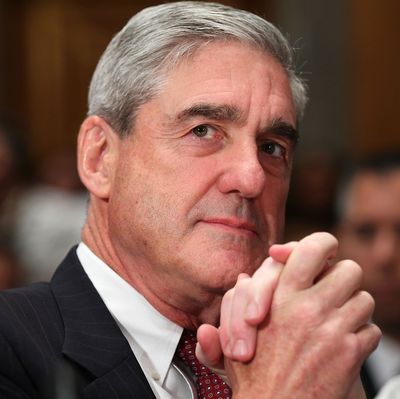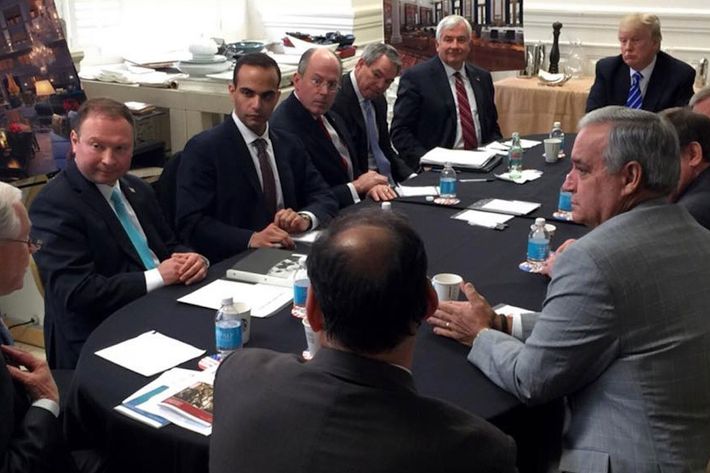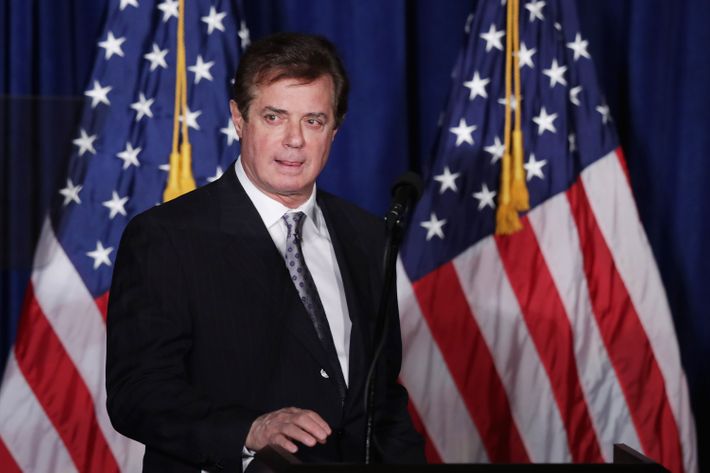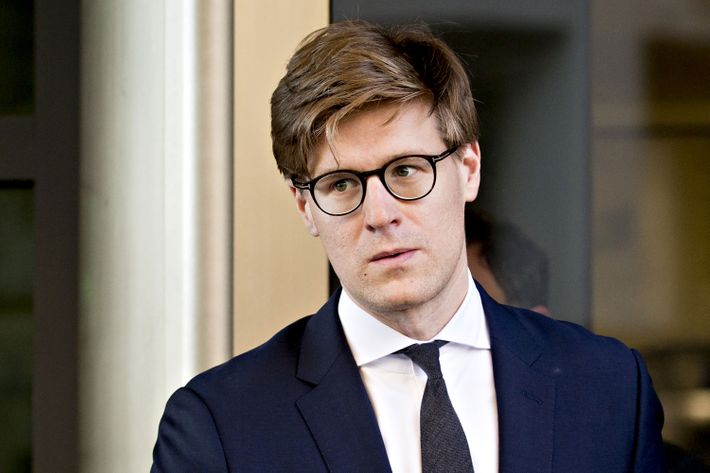
Nearly two years after Special Counsel Robert Mueller launched his investigation, we’re finally going to see what he turned up. On Thursday, Attorney General William Barr will send Congress the redacted Mueller report between 11 a.m. and noon. In what appears to be an attempt to spin the release, Barr will hold a press conference prior to the report’s release at 9:30 a.m., frustrating those who believe the attorney general is acting as Trump’s fixer in the Justice Department.
The biggest revelation from Barr’s four-page summary of the report was that Mueller is not recommending any further indictments. In countless tweets and public statements, Trump has insisted that there was “no collusion” with Russia, and if Barr is to be believe, Mueller hasn’t produced any evidence to the contrary. However, the Mueller probe has already yielded ample evidence of Russia’s efforts to make sure Trump won the 2016 election, and the connections between Trump associates and Russia — plus other crimes that fall under Mueller’s mandate.
As we await a full run down of what’s in Mueller’s “very comprehensive” report, here’s everything we already know.

George Papadopoulos lied to the FBI about Russian contacts
• In October 2017, court documents revealed that George Papadopoulos, a foreign-policy adviser to the Trump campaign, had been arrested as part of the Mueller investigation in July 2017. He pleaded guilty to making false statements to the FBI about his contacts with the Russians — specifically, “the timing, extent and nature of his relationships and interactions with certain foreign nationals whom he understood to have close connections with senior Russian government officials.”
• The court documents say Papadopoulos claimed he met a London-based professor with extensive ties to Russian government officials (who reports identified as Joseph Mifsud) before joining the Trump campaign. Mifsud actually took an interest in Papadopoulos shortly after he joined the Trump campaign, and during a meeting in April the professor “told him about the Russians possessing “dirt” on then-candidate Hillary Clinton in the form of “thousands of emails,” according to prosecutors. The conversation happened weeks before the Democratic National Committee revealed it had been hacked, and about a month after Clinton campaign chairman John Podesta was targeted with a phishing attempt.
• Around the same time, Papadopoulos met a Russian woman that he believed had ties to the Russian government as well. Over several months, Papadopoulos repeatedly tried to use his new associates’ connections to set up a meeting between top Trump campaign and Russian government officials — making it clear that Putin was interested in meeting Trump personally.
• Sometimes campaign officials ignored or rebuffed Papadopoulos, but at one point a high-level campaign official (believed to be then-campaign manager Paul Manafort) emailed another top official: “Let’s discuss. We need someone to communicate that DT is not doing these trips. It should be someone low level in the campaign so as not to send any signal.”
• In August 2016 another top campaign official (said to be national campaign co-chairman Sam Clovis) urged Papadopoulos to meet with Russians to foster ties with their government, saying, “Make the trip, if it is feasible.”
• Papadopoulos repeatedly lied to investigators in January 2017. It cost them the chance to catch Mifsud, the London-based professor, before he fled the U.S. Even after his guilty plea, a prosecutor said, Papadopoulos only made “begrudging efforts to cooperate.” In September of last year, he was sentenced to 14 days in prison.

Paul Manafort and Rick Gates allegedly laundered millions, conspired against U.S.
• On October 30, 2017, the same day Papadopoulos’s plea deal was unveiled, the special counsel announced charges against Manafort and his longtime business associate Rick Gates, who was also his deputy on the Trump campaign. The 12-count indictment included charges of “conspiracy against the United States, conspiracy to launder money, unregistered agent of a foreign principal, false and misleading FARA statements, false statements, and seven counts of failure to file reports of foreign bank and financial accounts.”
Prosecutors described an elaborate bank fraud and money laundering scheme linked to Manafort and Gates’s work for pro-Russian political parties in Ukraine. They said this went on from 2006 to at least 2016, but the charges were not linked to their work on the Trump campaign. (Conspiracy against the U.S. sounds dramatic but it can mean making false statements about your work with a foreign government.)
• In February 2018 Mueller filed new charges against Manafort and Gates, accusing them of laundering $30 million, failing to pay U.S. taxes for almost a decade, and using their real-estate holdings to fraudulently secure $20 million in loans.
• Mueller’s attempt to turn up the pressure worked — on Gates, at least. In February 2018 he agreed to cooperate with the special counsel and pleaded guilty to one count of conspiracy against the United States and one count of making false statements to FBI agents. Nearly two dozen more serious charges were dropped, and in January 2019, Mueller asked for a delay in Gates’s sentencing, citing his ongoing cooperation in “several ongoing investigations.”

A Dutch lawyer already served time
• Alex van der Zwaan pleaded guilty to lying to FBI agents about his connection to Gates, and was sentenced to 30 days in prison and a $20,000 fine. He is the first person sentenced in the probe and is currently serving his prison sentence at a low-security facility in Pennsylvania.
Michael Flynn lied to the FBI about the Russian ambassador
• On December 1, 2017, former national-security adviser Michael Flynn pleaded guilty to lying to the FBI about conversations he had with Russian ambassador Sergey Kislyak during the transition period. Court documents reveal that despite what Flynn told agents in January 2017, his talks with Kislyak were part of a coordinated effort by the Trump team to influence foreign policy before the inauguration.
• The documents say that a “very senior member” of the transition team (reportedly Jared Kushner) directed Flynn to discuss a United Nations resolution with Kislyak. Flynn admitting to asking Kislyak on December 22, 2016, to delay or defeat a United Nations Security Council resolution condemning Israel for its settlement policy. The Obama administration opted to abstain and the resolution passed.
• Flynn also admitted to talking with Kislyak on December 29 to urge Russia not to retaliate when President Obama imposed new sanctions over Russia’s election meddling. The court documents say he conferred with other top members of the Trump team several times, but it’s not clear what Trump himself knew. The next day President Vladimir Putin announced that Russia would not retaliate against the U.S. for the sanctions.
• Since Flynn pleaded guilty and agreed to cooperate with the special counsel, his sentencing has been delayed several times. Both sides are set to give a status report on March 13, 2019.
Russians engaged in an elaborate scheme to sway the election in Trump’s favor
• On February 16, 2018, Mueller charged 13 Russian individuals and three Russian companies with engaging in propaganda efforts intended to disrupt the 2016 election. While the indictments support the U.S. intelligence agencies’ conclusion that Russia was working to help Trump, the court documents do not address the hacking of Democrats. Instead, they focus on a Russian social-media push that began in 2014 with the goal of stirring division and shaking people’s faith in the U.S. election system, but eventually shifted to backing Trump.
• Court documents allege that the Internet Research Firm, a Russian troll farm, set out to conduct “information warfare” against the U.S. The company had a hundreds of workers and a multimillion-dollar budget, supplied by companies linked to Yevgeny Prigozhin, a St. Petersburg businessman with ties to Putin.
• Russians impersonated American citizens on social media and occasionally in person, posing as activists online, buying ads, and organizing rallies.
• Some of the Russians were in contact with “unwitting individuals associated with the Trump campaign,” but no Americans were accused of knowingly participating in Russia’s scheme. Mueller reached a plea deal with Richard Pinedo, a California man who committed identity fraud when he unknowingly sold bank-account numbers created using the stolen identities of U.S. citizens to Russians.
• None of the Russians are in custody and it’s unlikely that they will ever be tried. Naming them makes it harder for them to continue their secretive work, or travel abroad. Plus, it theoretically refutes the claim that Russia’s election meddling was a hoax — though of course, Trump cherry-picked from the indictment, falsely claiming that it proved “the results of the election were not impacted. The Trump campaign did nothing wrong — no collusion!”
Paul Manafort tried to get in Mueller’s way
• One of the charges against Manafort was related to payments he’d made to former politicians in Eastern Europe. Manafort allegedly continued lying about the details, at least into February of last year — and tried to convince his former PR colleagues to go along with his story, which would amount to a separate crime of witness tampering. One of those colleagues talked to the FBI instead. A few months later, in June 2018, Mueller stacked extra charges onto Manafort’s case.
• At the same time, Mueller revealed the identity of Manafort’s longtime partner in Ukraine: Konstantin Kilimnik, an interpreter trained by the Russian Army. He revealed that Manafort and Kilimnik had stayed in touch throughout Trump’s campaign. Manafort was in debt to a Russian oligarch — he apparently owed at least $10 million — and Manafort’s emails to Kilimnik in 2016 have made it clear that he wanted to use his role with Trump to trade political favors instead of paying the debt in cash. Kilimnik was the intermediary.
• Mueller has charged Kilimnik, too, with witness tampering, but the translator is safe in Russia and may never stand trial here.
Manafort kept on lying after pleading guilty
• In September 2018, Manafort admitted to obstructing the investigation and running a conspiracy operation in Ukraine. He promised “complete cooperation” with Mueller to avoid a trial that was on the brink of starting. But then he kept on lying to the FBI, Mueller announced two months later. What about? We don’t know yet, but Mueller said he’d explain it all in a memo before Manafort’s sentencing — which is scheduled for March.
The Russians tried to crack Hillary Clinton’s servers the very day Trump asked them to
• Remember that invitation Trump gave during a 2016 news conference? “Russia, if you’re listening, I hope you’re able to find the 30,000 emails that are missing,” the candidate said onstage. “I think you will probably be rewarded mightily by our press.”
Russia tried to hack her team’s emails that very same day, according to documents Mueller filed in July of last year. The announcement came as Mueller indicted 12 officers of Russia’s military-intelligence agency. He also chronicled many other espionage attempts by them: for instance, he said, they hacked state election boards, stealing information on 500,000 voters from one state alone. The indictment said they funded their work with cryptocurrency.
Michael Cohen continued lying after the campaign, too
• Michael Cohen, Trump’s lawyer, lied to Congress in August 2017 about business dealings Trump had with Russia during the campaign. Plans had been in the works for a Trump tower in Moscow, but Cohen claimed the negotiations had been cut off before the Iowa caucuses. They hadn’t. In reality, they continued at least until that summer, according to documents that have since come to light — and may have continued all the way to the election.
• In November 2018, Cohen pleaded guilty to lying to Congress. A week later, Mueller announced that Cohen had turned into an extremely helpful witness and had sat through seven meetings with the special counsel’s office, some of which were “lengthy.” Another revelation was that Cohen had kept Trump in the loop about those Russia negotiations all along.
Roger Stone allegedly made false statements to Congress
• Roger Stone, the brazenly amoral strategist who worked on Trump’s campaign briefly in 2015, communicated with anonymous Russian hackers and WikiLeaks during the period when they were working on Trump’s behalf. This isn’t news; the big revelation from Stone’s indictment on January 25, 2019 was that Stone allegedly lied to the House Intelligence Committee in 2017 about his contact with WikiLeaks. He also tried to interfere with a witness, the radio host Randy Credico, according to the indictment. He was arrested at his home in Fort Lauderdale early Friday morning, while still wearing his pajamas.
• The indictment also said that someone high up in Trump’s campaign was ordered to get in touch with Stone and ask him about what WikiLeaks could offer. It does not, however, lay out a clear narrative or time line of Stone’s contact with WikiLeaks and the anonymous hackers.
This post was originally published on the one-year anniversary of Mueller’s investigation. It has been updated throughout.





























